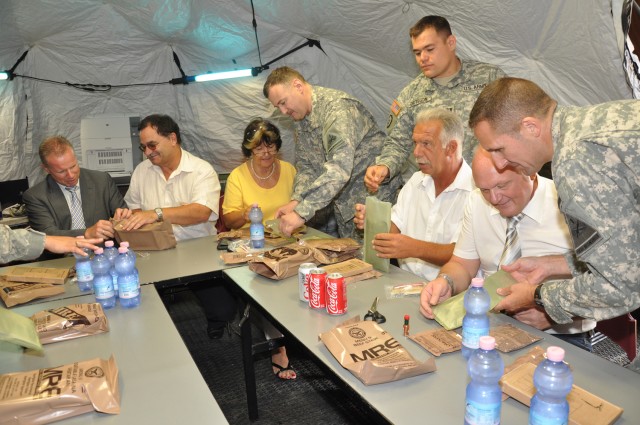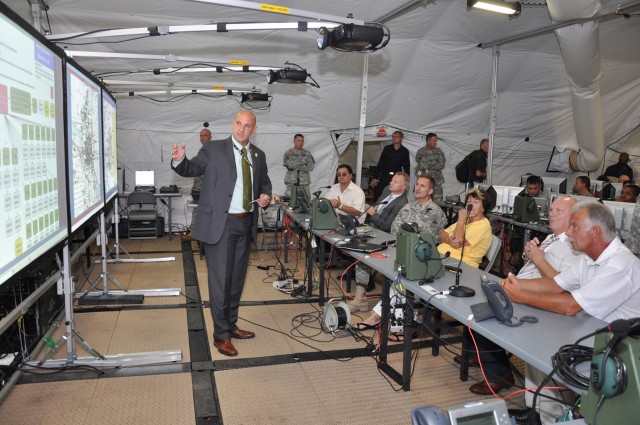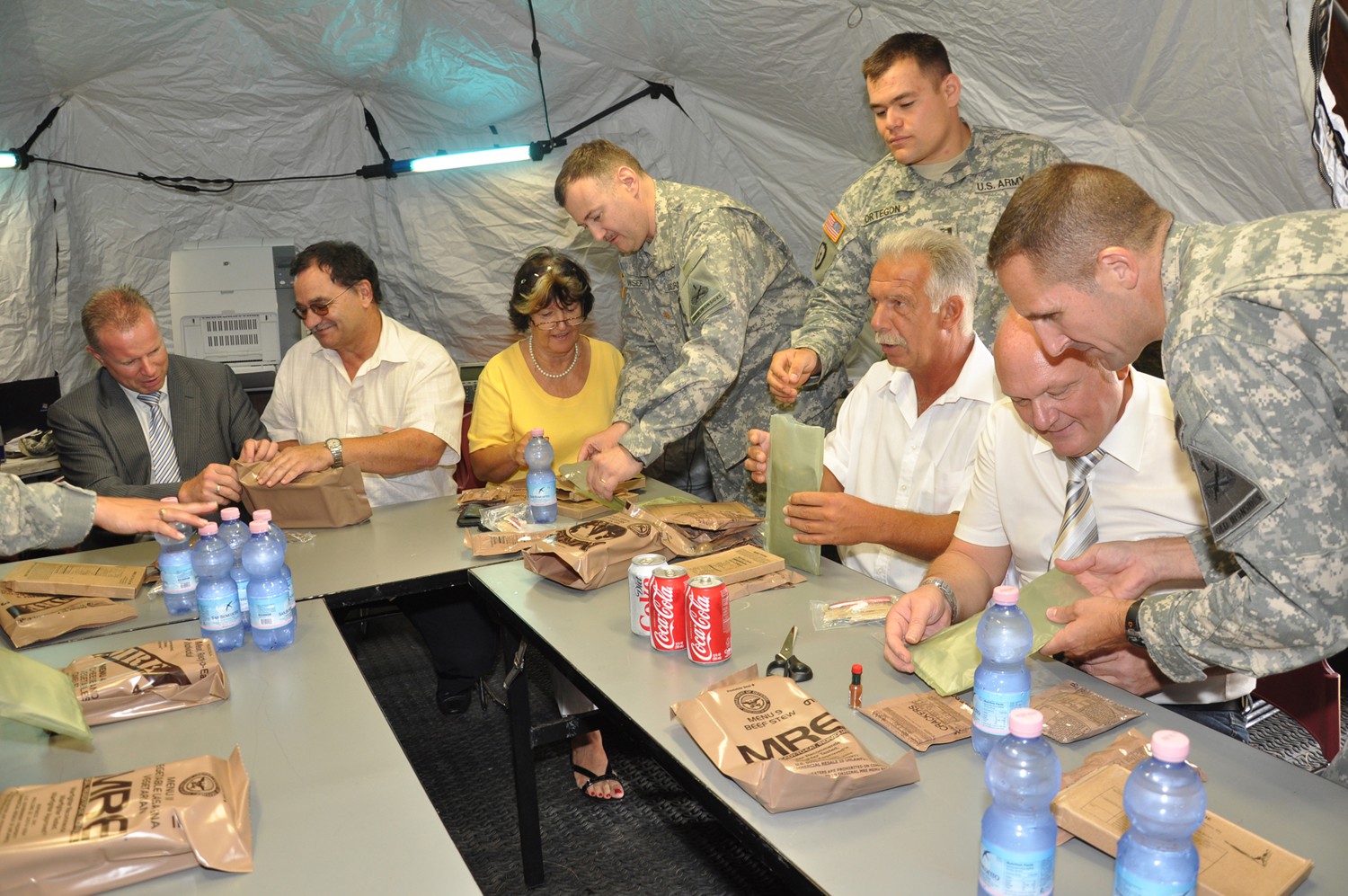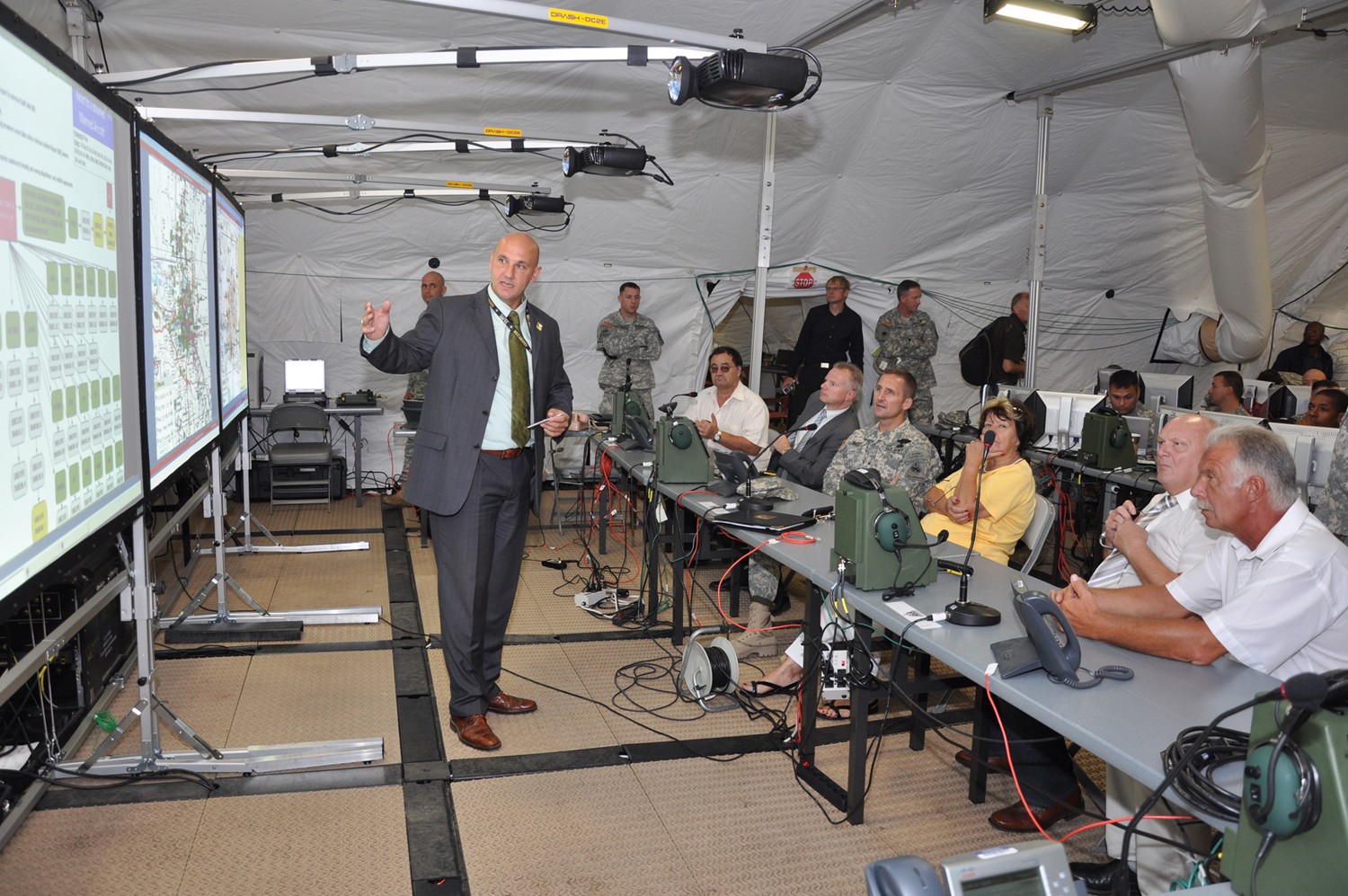WIESBADEN, Germany - Two new agreements between the United States and Iraq governments have changed the combat rules for American troops.
The nonbinding strategic framework agreement and a security agreement have carved out a different mission and a whole new playing field for 1st Armored Division troops set to return to Iraq by the end of the year.
"We're doing less and less combat operations," said Brig. Gen. Ralph O. Baker, 1st AD deputy commander, during a Command Post Exercise tour Aug. 12 attended by several local German leaders.
"This time next year (August 2010), there will be no combat operations (by U.S. troops in Iraq)."
The 1st AD will head to Iraq this winter for its third deployment as part of Operation Iraqi Freedom.
In preparation for assuming command and control operations of U.S. forces around Baghdad and in western Iraq, 1st AD is holding a series of training events.
"We're a command and control headquarters for many other units," said Lt. Col. Eric Bloom, 1st AD's public affairs officer, explaining that 1st AD's Headquarters will replace 1st Cavalry's when it deploys sometime around the December time frame and will serve under III Corps from Fort Hood, Texas.
Bloom explained that with Iraqi security forces having taken control of Iraq's cities, American forces are providing an advice and assistance role.
"They are a growing army becoming a very professional army," said Bloom, "and they have been able to take control of their own security. ... If the Iraqi security forces ask for our assistance, then we will be there to help and train them."
Baker explained that in the new strategic framework agreement, the United States has pledged to work with the Iraqi people to help sustain the country during political and cultural issues.
The security agreement gives the U.S. legal authority to operate in Iraq, requires U.S. troops to use the Iraqi legal system to detain and arrest anyone in Iraq and also sets Dec. 31, 2011, as the date the United States must have combat troops out of Iraq.
"We will judge success by us doing less and the Iraqis doing more. And we're very close to that already," said Baker.
With a "crawl, walk, run" approach to the division's latest training, Bloom said 1st AD leaders began the process with a battle-command seminar by sharing lessons learned with the current unit in Baghdad, holding a Command Post Exercise on Wiesbaden Army Airfield Aug. 17-21 and will head to the Joint Multinational Training Command in GrafenwAfAPhr and Hohenfels for a Mission Readiness Exercise in late September/early October.
"We're doing numerous battle drills," said Bloom, explaining that the training exercises in Wiesbaden and GrafenwAfAPhr are intended to train and familiarize division staff members with current Multi-National Baghdad procedures to fully understand how to operate within the assigned sector in Iraq. "We're checking what every person must do to be effective. It's a very precise process to coordinate."
Bloom added that 1st AD's area of responsibility, to be known in the future as U.S. Forces Central, will include al Anbar province (the region to the west of Baghdad) with U.S. Marines relinquishing that task "We're expanding out," he said.
Walking into the intelligence cell of the 1st AD's CPX command post, Baker explained the progression of Iraq's intelligence gathering.
"We used to (gather all of the information) ourselves and capture the insurgents all by ourselves. Then we started giving this information to the Iraqis. Now we're teaching Iraqis to do this themselves," said Baker.
During the division's projected 12-month deployment it will also be expected to take on a large, logistical mission, said Bloom. With current agreements between the United States and Iraq calling for U.S. forces to leave the country by the end of 2011, withdrawing equipment will take extensive planning.
Baker noted that by Aug. 31, 2010, the U.S. troop numbers in Iraq are expected to be downsized from 130,000 to 50,000.
"All of the things we brought in we'll now have to get out of the country. We'll have to work very closely with our logistical folks to move our equipment out of Iraq to ports in Kuwait and Jordan. ... That's a major endeavor," Bloom said.
Members of the division are expected to return to Wiesbaden after the deployment and then begin preparing for the division's eventual move to Fort Bliss, Texas.
On Aug. 12 local national leaders including Claus Baum of Wiesbaden Citizen Affairs; Georg Weitzmann, president of the Erbenheim Am Wasserwerk Garden Plot Association; and Mayors Regina Maass, Wolfgang Reinsch and Rainer Pfeiffer of Delkenheim, Erbenheim and Nordenstadt respectively spent several hours with Baker touring the unit's CPX.
After a demonstration of how the division headquarters will operate in Baghdad using a downed helicopter computer simulation as an example, the local leaders were invited to sample Meals, Ready to Eat rations.
"We wanted to stress how much we appreciate all of the support we receive from the local national communities," said Bloom, about the mayors' visit. "The community relationship we have is wonderful. Our families will still be here when we deploy and that support is something we really do appreciate."




Social Sharing